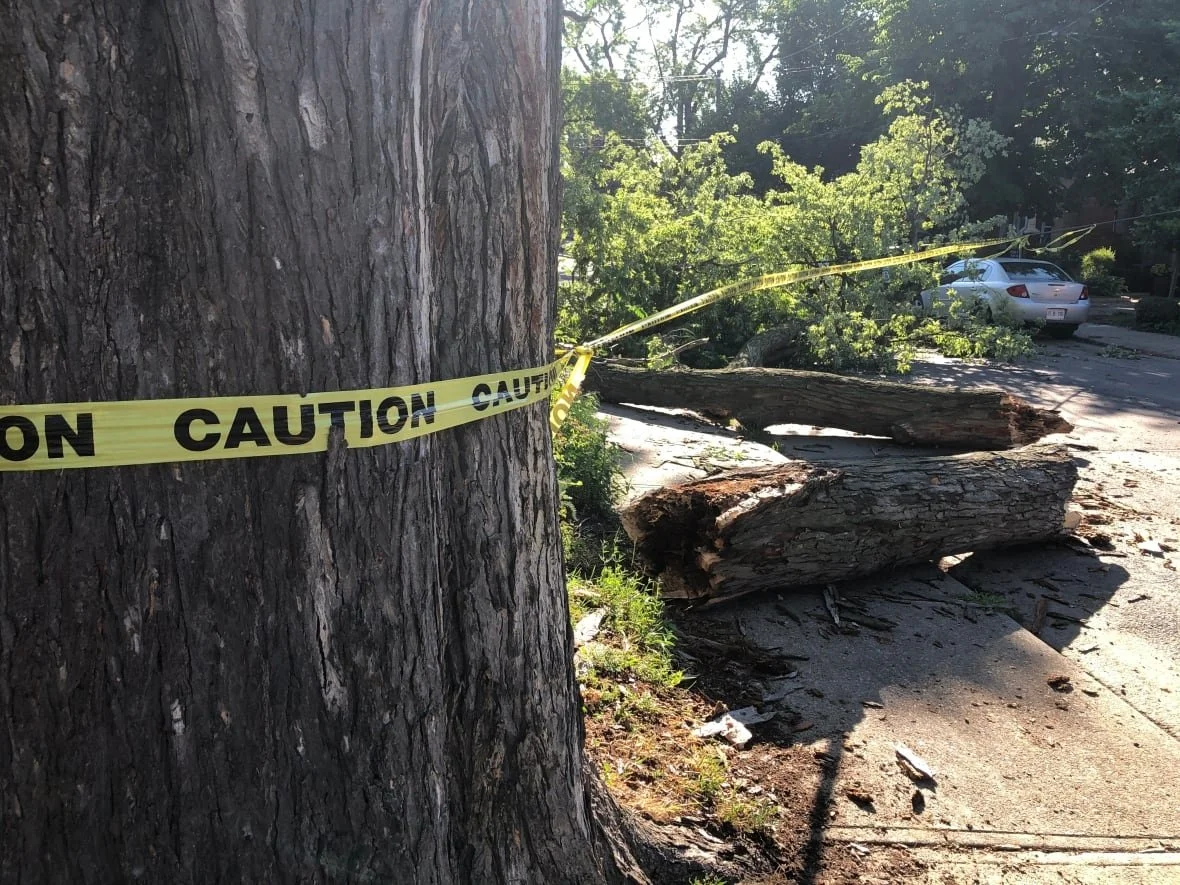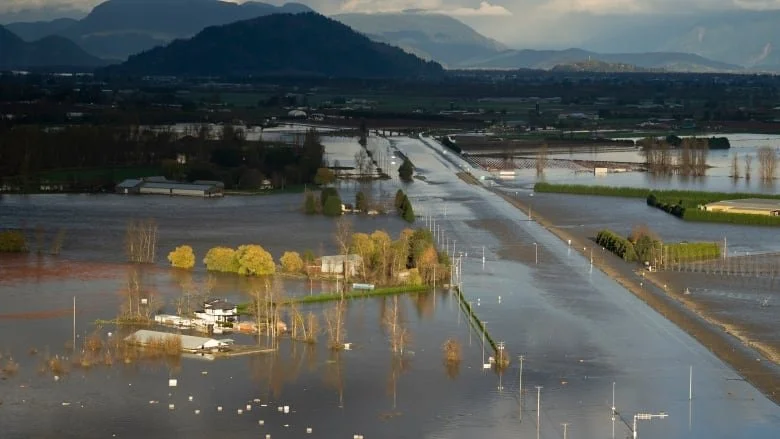TD Insurance has teamed up with the Institute for Catastrophic Loss Reduction (ICLR) to launch the latest iteration of a program that offers strategies to minimize risks associated with extreme weather events. The newest Showcase Home initiative coincides with the growing threat of urban flooding in Canada. According to data from CatIQ, basement flooding and water-related incidents from the past year resulted in more than a billion dollars in property damage.
It's been 10 years since the Big Flood. How the changing climate is shaping life in Calgary
In the decade since the Big Flood of 2013, Calgary has seen a number of extreme weather events and scorching, smoky summer days. Four Calgary disasters are included in the Insurance Bureau of Canada's Top 10 list of costliest years for insured losses in Canada — three since the flood, the fourth occurring the year before. The past decade has seen a surprise September snowfall in 2014, a devastating hailstorm in 2020 that resulted in $1.2 billion in damages, and a sweltering and deadly heat dome in the summer of 2021. A number of "catastrophic" weather events have been recorded in almost every year since June 2013, resulting in billions of dollars in damages.
Paradox between warming climate and intense snowstorms, say scientists
There is a complex, counterintuitive relationship between rising global temperatures and the likelihood of increasingly intense snowstorms across Canada. Winters are becoming on average milder and warmer than they used to be, but there has also been a noted rise across the country in extreme weather events, such as intense snowstorms, said John Clague, a professor of geosciences at Simon Fraser University, in Burnaby, B.C.People might think it illogical that parts of the country are seeing more snowstorms as the climate warms, he said. “What climate modelers are finding is that climate change involves more frequent extremes.”
UBCO engineers dive into local flood recovery, prevention
While infrastructure clean-up and repairs continue across the province after the extreme weather events of 2021, UBC Okanagan researchers have created measures to help municipalities mitigate damage from future climate-related disasters. “Communities across British Columbia have established strong policies and strategies to prepare and limit damage due to these extreme events, but policies related to post-disaster management are still in their infancy,” says Sadia Ishaq, a doctoral candidate in UBCO’s School of Engineering and lead author of a new paper that examines municipal risk management strategies.
Narhwal Week, episode 3: Can Canada survive flooding?
This is the third episode in a weeklong collaboration between The Big Story and The Narwhal, an award-winning non-profit publication that provides in-depth coverage of climate issues across Canada. More than 200 million people could be displaced from their homes worldwide in the next few decades as extreme weather events become more frequent and intense. The biggest climate change risk in Canada? Flooding.
Canadian climate tech built with Western expertise to be part of joint mission with NASA
Extreme weather events are increasing in frequency and intensity and the dynamics of Earth’s atmosphere is ever-changing. A new pan-Canadian collaboration will measure aerosols, water vapour and clouds and how they interact to impact Earth’s weather and climate as part of NASA’s Atmosphere Observing System (AOS) mission. The Canadian Space Agency (CSA) will collaborate with NASA on AOS with its High-altitude Aerosols, Water vapour and Clouds (HAWC) mission. The mission consists of two Canadian instruments on a Canadian satellite and a third instrument on a NASA satellite, all planned for launch in 2031. These innovative instruments will provide critical measurements, enabling Canadian climate scientists and weather forecasters to better understand and predict extreme events like severe storms, floods, droughts and poor air quality conditions.
Severe drought torments British Columbia, a year after devastating floods
Nearly a year ago, flood waters inundated swaths of south-western British Columbia. Mudslides destroyed sections of highways and swollen, turbid rivers washed away houses and bridges. Now, the region has the opposite problem: months of drought have begun to take a toll on what was once dubbed Canada’s “wet coast”. And as unpredictable weather events become a hallmark of a changing climate, experts warn that the two events are linked – and that a culture of overconsumption and poor resource management threaten to further amplify the effects of the current crisis.
Okanagan Water Board bracing for the effects of climate change
Climate change is here, but are we ready to adapt to the impact of changing and more extreme weather events? That is the question politicians continue to grapple with, but for the Okanagan Basin Water Board debating the realities of climate change is no longer an issue, but rather how will Okanagan Valley communities be prepared and respond to intense weather events.
Climate change now considered one of top threats facing Canadian children: report
The latest in a series of annual reports on challenges facing children and youth in Canada is identifying climate change as a top threat for the first time. Released on Wednesday (Sept. 7), the fifth annual Raising Canada report says the mental and physical impacts of the world’s rapidly changing climate, as well as the disproportionate effect it has on marginalized and racialized kids, now deserves greater attention. Air quality is worsening, leading to an uptick in bronchitis and asthma among children and youth, while an increase in the occurrence and intensity of extreme weather events also puts them at risk, report authors found in their literature review. The impacts are particularly harsh for children with intersecting inequities.
B.C. residents urged to prepare for floods and wildfire
British Columbians are asked to prepare for natural disasters ahead of this year’s spring freshet and wildfire season. B.C. government officials said there are a number of steps you can take to make sure you are ready in the event of a disaster. “As we’ve seen in recent years, from wildfires to floods, many households in the province are uninsured or underinsured for the hazards we face in British Columbia, which are becoming more frequent due to climate change,” said Mike Farnworth, Minister of Public Safety and Solicitor General. Provincial government officials recommend purchasing flood and fire insurance to ensure you have some financial protection.
Cities are abandoning homes that will be destroyed by climate change
Grand Forks, B.C., resident Les Johnson is compiling photos to preserve the memory of a flood-damaged neighbourhood before it's fully gone. In May 2018, heavy snowpack and several days of torrential downpour caused local rivers in the southern Interior B.C. city to overflow. This led to severe property damage in the neighbourhood of North Ruckle, which sits on the bank of the Kettle River in the province's Kootenay-Boundary region.
Protect Your Home from Flooding
Weather in Canada is getting warmer, wetter and stormier due to climate change. Extreme weather events that we used to experience twice a century are now expected to happen every six years. Did you know that since the late 1940’s, in Canada: Average temperatures have increased by 1.3 degrees Celsius; Average rainfall has increased by 12 per cent; and We experience an additional 20 days of rain each year?
Indigenous communities to be hit with ‘ecological grief, loss of land and traditional knowledge’ because of climate crisis
The list of how the climate crisis is affecting Indigenous communities is long — and everything on it is to the detriment of First Nations, Inuit and Métis people says a new report from Health Canada. “The changing climate will exacerbate the health and socio-economic inequities already experienced by First Nations, Inuit, and Métis peoples, including respiratory, cardiovascular, water- and foodborne, chronic and infectious diseases, as well as financial hardship and food insecurity,” says the report called Health of Canadians in a Changing Climate that was released Thursday.
Province, Ducks Unlimited create strategies to protect wetlands
With global warming, the B.C. government is looking for ways to protect watersheds. On Tuesday, the province released its Watershed Security Strategy, which includes advice from Ducks Unlimited Canada, and the conservation group calls it an important step. The discussion paper explores key issues including climate change, wildlife habitats, sources of drinking water, as well as community and economic stability. Sarah Nathan, Ducks Unlimited Canada’s manager of provincial operations for B.C., was on hand for the event. She joined George Heyman, Minister of Environment and Climate Change Strategy, at a virtual announcement to discuss the critical role wetlands play in the health and security of watersheds. Referencing the gamut of floods, droughts, wildfires and debris flows that devastated the province this past year, Nathan stressed that protecting and bolstering wetlands is a must.
B.C. securing watersheds for a stronger future Updated on Jan. 25, 2022
Climate change and extreme weather events are strengthening the call for protection and restoration of B.C.’s watersheds to ensure healthy ecosystems support communities with secure access to clean water. The Province is developing B.C.’s first Watershed Security Strategy and Fund. The first step is to explore key themes, including governance, climate change, ecosystems and sources of drinking water, as well as community and economic stability, through the release of a discussion paper for feedback. The Province is developing the strategy with Indigenous Peoples and in collaboration with other levels of government.
From tree maintenance to simple hardware store upgrades, here's what you can do to prepare for climate change
She said some preparations are as easy as a trip to the hardware store. "Make sure your eavestroughs are clear and your downspouts allow water to flow away from your foundation. Put valuable things or potentially toxic items up on a basement shelf, so they don't get damaged or contaminate water." Lou Di Gironimo, general manager of Toronto Water, says storms have become more severe over the past few decades and the city has invested billions of dollars in flood mitigation programs.
B.C. disaster drives home need for flood-resistant infrastructure across Canada, climate experts say
Climate specialists say a major overhaul of infrastructure in communities across Canada is needed to make homes, buildings, roads and rail lines more resilient to extreme weather events, as climate change makes those events more likely. "Infrastructure decisions in Canada are not accounting for a changing climate," said Ryan Ness, research director for adaptation at the Canadian Institute for Climate Choices.
Abbotsford water pump an 'example' of broader climate change infrastructure issues: experts
Four massive water pumps working to keep a low-lying community in British Columbia from devastating floods is shining a light on a larger, Canada-wide issue. Experts say infrastructure across the Canada was not built to withstand the impacts of climate change and the increasing severity of extreme weather events. On Wednesday, Mayor of Abbotsford, B.C. Henry Braun told a news conference that the Barrowtown Pump Station which is struggling to keep Sumas Prairie from completely flooding was working at “maximum capacity.”
BEYOND LOCAL: Ancient water management techniques may help farmers experiencing drought
This year witnessed one of the hottest and driest summers in recent history for Western Canada and the American Southwest. The resulting droughts adversely affected food supply and helped send meat prices rising three times faster than inflation. Despite the severity of these droughts, the worst may be yet to come. Extreme weather events are expected to become increasingly severe and frequent in the Prairies, with longer dry periods coupled with the risk of floods from intense rainstorms.
Climate risk scores could reshape Canadian real estate markets, some experts say
If the house you're about to buy is going to be under water in 30 years, should that be disclosed during the sale? Chris Chopik says "yes." The Toronto real estate agent has been calling for years for a climate risk assessment to be added to real estate listings in Canada the same way that data is readily available on the ease of walking from any address. He said these conversations need to become commonplace and factored into a property's value.





















